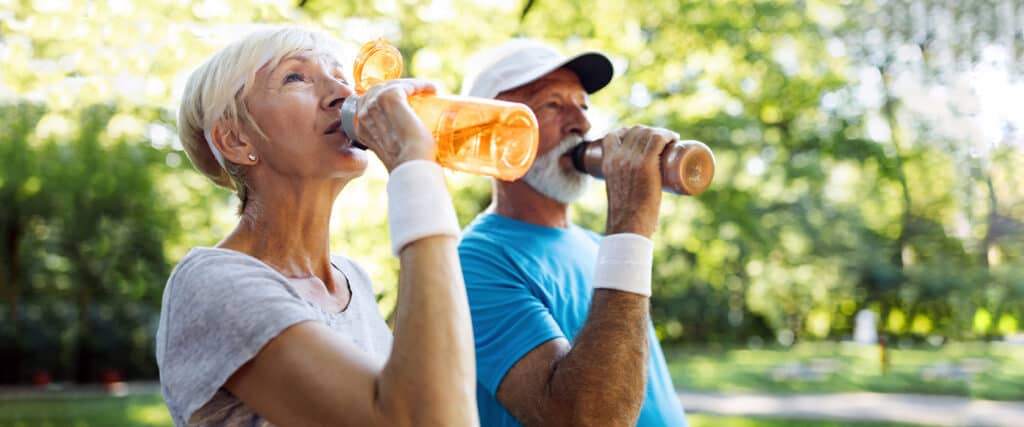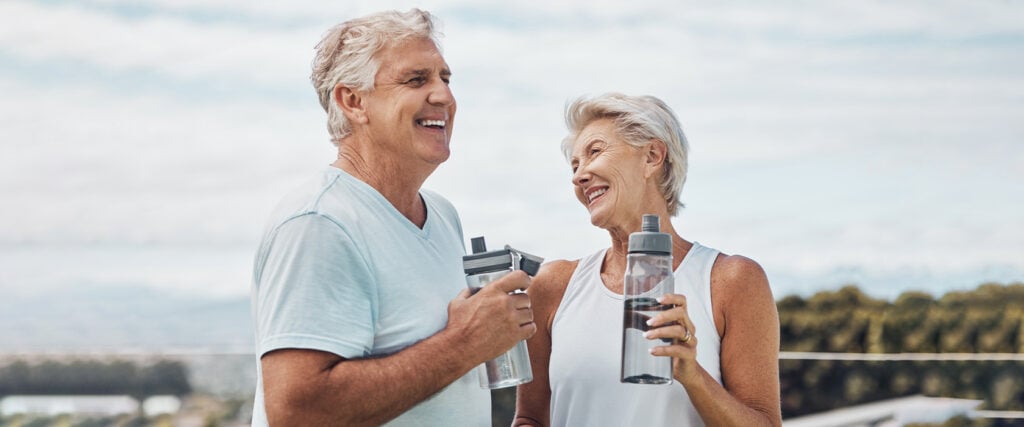
How to Avoid Dehydration in Seniors
Summer’s heat is here, and with it comes an increased risk for dehydration in seniors. Of course, hydration is vital for seniors and people of all ages year-round, but even more so during extreme summer months. We know that hydration is a key part of senior care, so let’s look at the possible risks associated with dehydration, and ways you can help seniors stay hydrated!
Signs of Dehydration in Seniors
Dehydration is harmful for all age groups, but it’s especially common and very serious when it happens to seniors. That’s why it’s so important to monitor dehydration symptoms and know how to avoid it. The signs of dehydration in seniors are not always obvious and can often range from mild to severe. Symptoms can include:
- Headache
- Nausea
- Dizziness
- Confusion or disorientation
- Dry mouth
- Fainting
- Loose skin or skin that doesn’t return to normal after pinching
- Urinating less than usual
- Constipation
- Muscle cramping
- Fast heart rate
- Drop in blood pressure
Risks of Dehydration & Heat-Related Illnesses

Dehydration can be particularly harmful to seniors for the following reasons:
- Seniors typically do not adjust as well as others to increased temperatures.
- Seniors are more likely to have chronic medical conditions that affect their body’s response to temperature.
- Seniors are more likely to take prescription medications that may cause increased fluid loss through the kidneys, as well as impair their body’s ability to sweat or control their temperature.
- There is less water in the bodies of seniors, which can lead to greater difficulty for older kidneys to maintain fluid balance. Seniors also typically have less thirst sensations.
- Seniors experiencing a decrease in mobility or who are cognitively impaired often have difficulties recognizing and meeting their own needs.
If a senior becomes overheated for too long or is exposed without protection to the sun, they may experience a heat-related illness. These can include:
- Heatstroke: if you suspect a senior is experiencing heatstroke, seek immediate emergency treatment. If untreated, heatstroke can cause damage to the brain, heart, kidneys and muscles.
- Heat Exhaustion: sudden dizziness can occur when a senior is active in hot weather. If a senior is experiencing this, encourage them to rest in a cool place, put their legs up and drink water.
- Heat Cramps: these are painful spasms that occur in the stomach, arms or legs. Seniors experiencing this should stop their activity and rest inside or in the shade and drink plenty of fluids.
- Heat Edema: this is a sudden swelling in the ankles and feet when the body is overheated. In order to reduce swelling, encourage the senior to put their legs up. If that doesn’t work, encourage medical attention.
Tips for Helping Seniors Stay Hydrated and Cool
It’s important to note that summer is not the only time seniors are at risk of dehydration. Here are some key tips to helping seniors stay hydrated and cool all year-round:
- Encourage residents to drink plenty of liquids, such as water, fruit or vegetable juices or drinks that contain electrolytes. Avoid alcohol and caffeinated beverages.
- If a senior’s doctor has limited the amount of fluid they can drink or they are on water pills, make sure they ask their doctor how much water they should drink while the weather is hot.
- Encourage seniors to keep water near their favorite chair, or places where they spend most of their day.
- Try adding fruit to flavor water and make it more appealing (without adding sugar or unnecessary calories).
- Encourage seniors to keep their shades/blinds/curtains closed during the hottest part of the day, and to open their windows at night if the weather is cool.
- Avoid scheduling outdoor exercise or other physical activities during the hottest part of the day. Instead, plan indoor activities where it’s air-conditioned, so seniors can stay cool and out of the sun.
- If planning outdoor activities, advise seniors to wear lightweight, light-colored, loose-fitting clothing. Natural fabrics – like cotton – will feel cooler than synthetic fibers.
- When going outside, advise seniors to wear an SPF 15 or higher, broad-spectrum sunscreen, and encourage reapplication throughout the day.
It’s important to avoid dehydration in seniors, and ClearWellness can be an invaluable resource to help seniors and their caregivers by encouraging members to stay hydrated. Our Certified Health and Wellness Coaches work with seniors to create wellness plans and provide guidance on proper diet and nutrition, as well as sleep and exercise. Our smart devices also track vital signs and provide SOS services if a senior resident experiences a heat-related illness or other emergencies.
You Might Also Like

Collaborative Approaches to Senior Wellness: The Power of Support Systems
